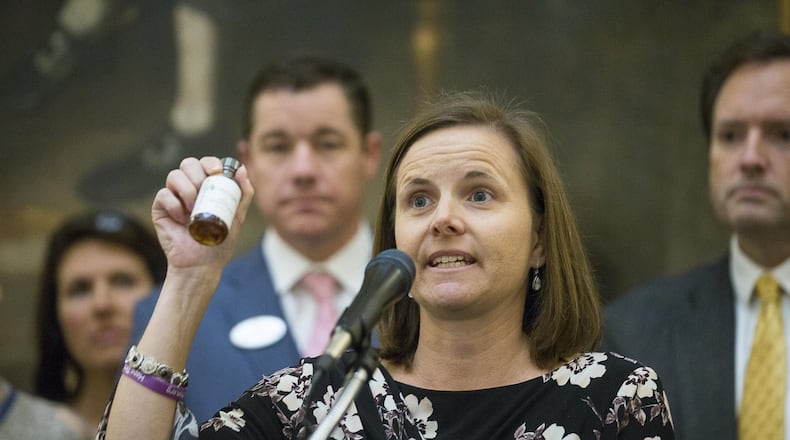Medical marijuana cultivation started on the night licenses were awarded in Georgia.
Trulieve opened a nursery in its South Georgia greenhouse as soon as it became one of two companies that won a license last month to grow, process and sell medical marijuana oil to registered patients.
By the end of the year, Trulieve hopes to begin selling low THC oil to registered Georgia patients suffering from illnesses including severe seizures, Parkinson’s disease and terminal cancers.
But several recent lawsuits from companies that didn’t win licenses claim that the selection process was unfair, and regulations for testing and dispensing still need to be approved.
The legal challenges already prevented the state from issuing four more licenses, leaving the state with only two companies to serve Georgia’s 24,400 patients and 17,700 caregivers.
State law has allowed registered patients to use low THC oil since 2015, but until now, they’ve had no legal way to buy it.
“Georgia is poised to have a fantastic launch for this market,” said Kim Rivers, CEO and founder of Trulieve, one of the largest cannabis companies in the United States, with operations in 11 states. “We just don’t want there to be delays for those who have been waiting seven years for this product to be available.”
Credit: Trulieve
Credit: Trulieve
Both of Georgia’s licensees, Trulieve and a newer company, Botanical Sciences, will be allowed to open five dispensaries each, serving only patients who received a doctor’s approval and signed up with the state’s Low THC Oil Registry. Trulieve’s first two dispensaries are planned for Macon and Marietta.
Construction is nearly complete on Botanical Sciences’ facility in Glennville, a southeast Georgia city of less than 4,000 people. But unlike Trulieve, the company hasn’t started the plant cultivation process. Trulieve’s greenhouse is located in Adel, a city of 5,000 residents in South Georgia.
“Botanical Sciences is honored to be selected and awarded a Class 1 production license by the Georgia Access to Medical Cannabis Commission,” the company said in a statement. “It looks forward to improving the lives of Georgians with much-needed and long-awaited medicine.”
Georgia is one of 37 states that allow the medical use of cannabis, according to the National Conference of State Legislatures. Georgia’s law limits medical marijuana to no more than 5% THC, the compound that gives users a high.
After so many years of waiting for a functioning medical marijuana program, patients and their caregivers remain wary.
Shannon Cloud, whose teenage daughter uses THC oil to mitigate seizures, said patients are often left without information from the Georgia Access to Medical Cannabis Commission about the slow-moving process and when they can finally obtain medicine.
“It seems like there is still a lot of work to do,” said Cloud, who lives in Mableton. “We are incredibly frustrated that they say they are doing this for the patients, but when we reach out for information, they don’t even respond at all.”
The executive director of the commission, Andrew Turnage, said it is doing everything it can to complete a difficult licensing process amid lawsuits and companies’ protests. The commission awarded two licenses for companies to use 100,000 square feet of indoor growing space, but the lawsuits prevented the commission from licensing four more companies with 50,000 square feet.
“There will be no delay on the commission’s part. At the junctures where we’ve been forced to delay our movement, it’s purely to comply with the law,” Turnage said. “We’re certainly very excited to have our Class 1 licensees begin with their process, making THC oil and products for our patients here in Georgia.”
At least nine companies that wanted to sell medical marijuana in Georgia — but weren’t chosen for licenses — filed lawsuits in county courts during the past few weeks.
These complaints, such as one by a company called Symphony Medical, argue the process was “unrealistic and unfair” because it operated under selection rules approved by the Georgia General Assembly that kept most documents confidential, denying the company opportunities to make a case that it should have won a license.
Superior court judges in some of those cases have ordered the Georgia Access to Medical Marijuana Commission to stop its licensing process so the courts can review the matter, but attorneys for the state have filed motions seeking to vacate those orders. In one case, a Tift County judge on Friday upheld a stay involving a company called Georgia Bioscience Research, and further court hearings are scheduled.
While the legal process plays out, Trulieve and Botanical Sciences are still planning to produce medical marijuana in Georgia. The state’s two licenses remain valid after they were issued immediately after the commission voted unanimously to approve them on Sept. 21.
About the Author




